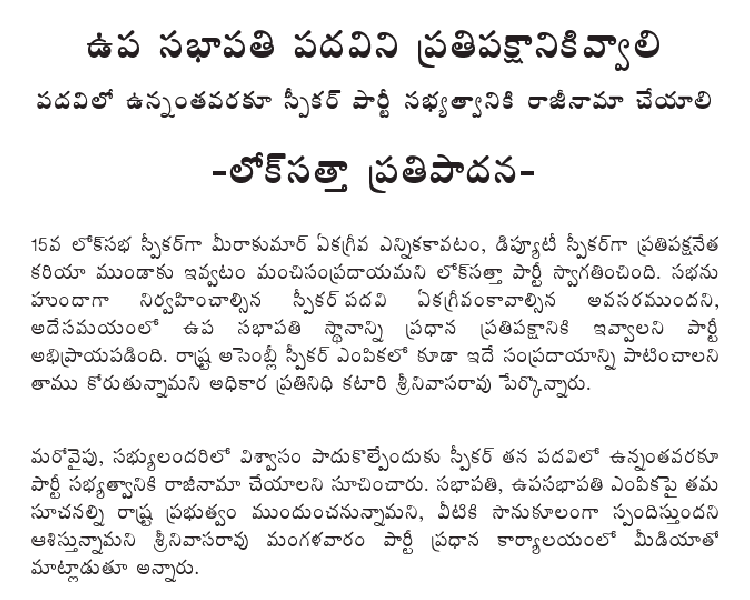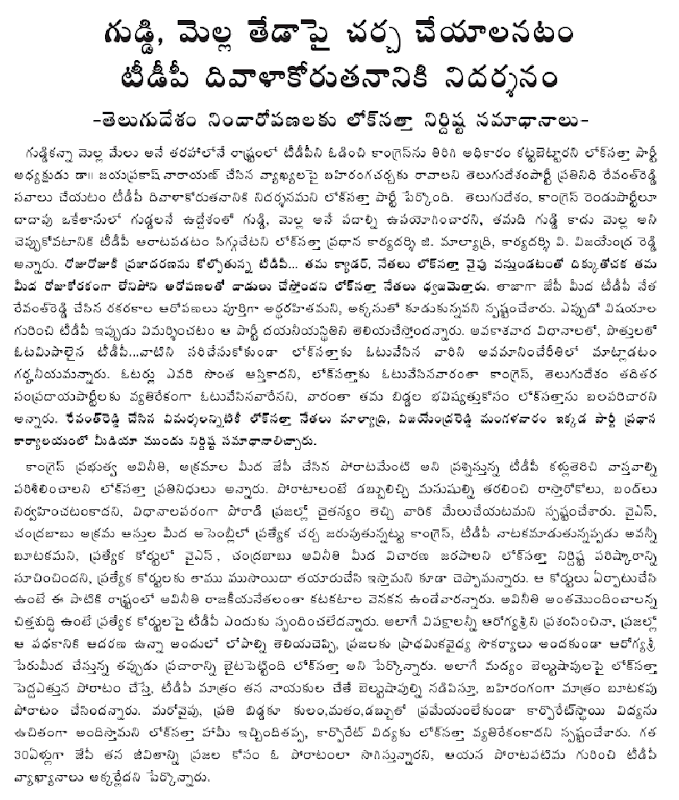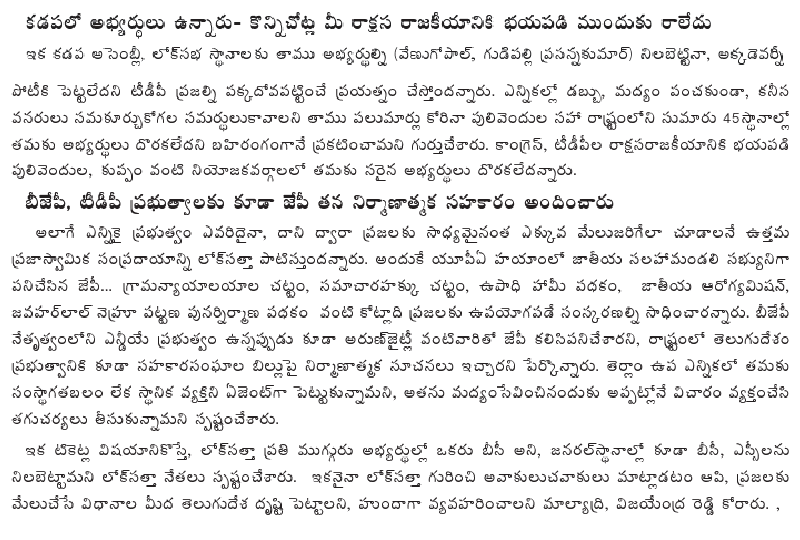Press Releases Archive
Let parties field women in one-third seats: Lok Satta’s alternative
The Lok Satta Party today wholeheartedly welcomed the UPA Government move to provide for reservations to women in legislative bodies as part of its 100-day program.
Addressing a media conference, party President Dr. Jayaprakash Narayan recalled that that a Bill to provide for women’s reservations had been introduced many times in the last 13 years but had not been passed apparently because most parties were not serious about it.
Dr. JP pointed out that the Bill as it is conceived is seriously flawed. The Bill proposes reservation of one-third seats for women and the rotation of such reserved seats once in every general election. As a result, two-thirds of incumbents will be forcibly unseated in every general election. When male incumbents are forced out, they field their womenfolk as proxies and hinder development of natural leadership. “Such compulsory unseating violates the very principles of democratic representation and jeopardizes the possibility of any legislator choosing a constituency and nursing it. When legislators do not have the incentive to seek re-election from the same constituency, politics will become more predatory and unaccountable. The Bill in its present form is silent about women’s representation in the Rajya Sabha and the Legislative Councils. In addition, the Bill warrants a constitutional amendment.”
Studying all these, the Lok Satta had as early as 1999 presented an alternative for consideration by all political parties. It calls for an amendment to the Representation of the People Act making it mandatory for every recognized political party to field women candidates in one-third of constituencies. To prevent a party from nominating women candidates only in States or constituencies where the party’s chances of winning are weak, the Lok Satta proposes that each party should consider the State as a unit for fielding women candidates in elections to the Lok Sabha. In other words, a party has to field one-third of women candidates in every State. A party’s failure to field the requisite number of women entails a penalty. For the shortfall of every woman candidate, the party cannot field male candidates in two constituencies.
The Lok Satta Bill proposes that for reservation of seats for women in a State Assembly, the unit shall be a cluster of three contiguous Lok Sabha constituencies.
Dr, JP said that the Constitution and the Representation of the People Act should be amended to provide for reservation of one-third of seats to women in the Rajya Sabha and the Legislative Councils.
The Election Commission had endorsed the Lok Satta Bill, Dr. JP said.
Dr. JP appealed to all political parties to adopt the Lok Satta’s hassle-free and flawless proposal, and ensure adequate representation to women in legislatures.
Smt. N. Saroja devi, convenor of Mahila Satta, Party spokespersons Katari Srinivasa Rao and V. Vijayendar Reddy were also participated in the press meet.
Charges against Dr. JP malicious: Lok Satta
Frustrated over the resounding rebuff it received in the 2009 elections and worried over the exodus of its cadre into the Lok Satta, the TDP is resorting to baseless and malicious allegations against the Lok Satta and its founder Dr. Jayaprakash Narayan, charged the party today.
The Lok Satta rebutted TDP leader Revanth Reddy’s allegations against Dr. JP point-by-point and said that far from realizing that its opportunistic policies and alliances had led to its debacle, the TDP was insulting voters by faulting them. The voters did not constitute the vote bank of any party and all those who voted for the Lok Satta were opposed to all other parties including the TDP and the Congress.
Talking to the media, party General Secretary G. Malyadri and spokespersons K. Srinivasa Rao, V. Vijayendra Reddy said that the TDP seemed to be unaware of the saying in Telugu that a squint-eyed person is better than a blind person. In the Lok Satta’s opinion, there was little to choose between the Congress and the TDP because they belonged to the same genre and that the voters opted for the lesser evil.
Replying to the query on Lok Satta’s track record in fighting Congress corruption, the Lok Satta leaders recalled the party had demanded the constitution of special courts to try cases of corruption when Opposition leader N. Chandrababu Naidu and Chief Minister Dr. Y. S. Rajasekhara Reddy traded allegations of massive corruption against each other in the Assembly. Significantly, both the traditional parties chose not to respond to the Lok Satta demand. A fight against corruption need not involve enforcing bandhs and rasta rokos with mobilized crowds.
The credit for exposing the inadequacy of ‘Arogyasri’ – welcomed by all parties and beneficiaries --in providing health for all goes to the Lok Satta. While the Lok Satta launched a large-scale agitation against belt shops, the TDP enacted the farce of an agitation since some of its leaders themselves operated belt shops. The Lok Satta is committed to providing education of corporate college standards to every child irrespective of its caste and religion but is not opposed to corporate education. The Lok Satta did indeed field a candidate in the Kadapa Lok Sabha seat, contrary to the TDP charge. The Lok Satta did not contest in 45 Assembly constituencies including Pulivendula because it could not attract competent candidates who were prepared to fight without inducing voters with money and liquor.
The Lok Satta believes that it should strive to benefit the people to the maximum extent, whichever party happened to be in power. By being a member of the National Advisory Council, Dr. JP had played a pivotal role in the formulation of the Right to Information Act, the Gram Nyayalay Act, the National Rural Employment Guarantee Scheme, the Jawaharlal Nehru Urban Renewal Mission and the National Rural Health Mission. He worked closely with BJP leaders like Arun Jaitley when the NDA was in power and offered his constructive suggestions on the Bill to amend the Cooperatives Act during Telugu Desam rule in Andhra Pradesh.
Mr. Malyadri ,Mr. Srinivasa Rao and Mr. Vijayendra Reddy said that one of every three candidates fielded by the Lok Satta in the 2009 elections happened to be a BC and that the party chose SC candidates even for unreserved seats.
The Lok Satta suggested that the Speaker of the Legislative Assembly be elected unanimously and the Deputy Speaker’s position offered to the Opposition.



